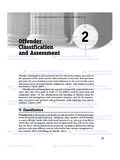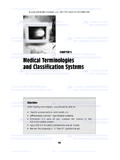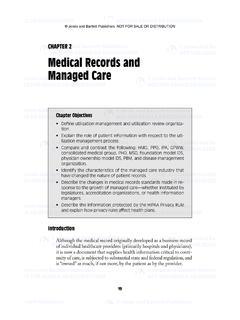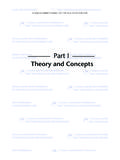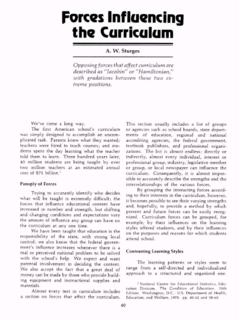Transcription of The Philosophy and History of Prisons
1 1 IThe Philosophy andHistory of PrisonsPoetic JusticeBuild prisonsNot day-careLock em upWhat do we care?Hire cops, not counselorsStaff courts, not clinicsWage warfareNot welfareInvest in felonsRipen em like melonsEat em raw, thenAsk for moreMore povertyMore crimeMore men in prisonMore fear in the streetMore ex-cons among usPoetic justiceRobert 9/28/05 8:51 AM Page 9/28/05 8:51 AM Page 231 Understand the definition of punishment. Be able to articulate the retributive and utilitarian rationales forpunishment. Understand the social contract and how it supports the right ofsociety to punish. Distinguish between incapacitation and punishment. Understand the restorative justice Rationale forImprisonmentJoycelyn M.
2 PollockTexas State University San MarcosWhy do we punish? Why do we use prison instead of other types of punish-ment? In this chapter, we are concerned with the fundamental rationale for theexistence of Prisons . What do we want them to be? Punishment is a natural re-sponse to fear and injury, and prison seems to be our favorite of PunishmentMost people would agree that hurting someone or subjecting them to pain iswrong. However, punishment,by definition, involves the infliction of pain. Doesthis make punishment wrong? Philosophers are divided on this issue. Onegroup believes that inflicting pain as punishment is fundamentally differentfrom inflicting pain on innocents, and therefore is not inherently wrong.
3 Anothergroup believes that punishment is a wrong that can be justified only if it resultsin a greater good (Murphy 1995).Those who hold the first view do not feel it necessary to justify punishmentbeyond the fact that the individual deserves it. This would be considered a ret-ributiveapproach. The second view justifies punishment through the secondarypunishmenta pain orunpleasant experience in-flicted upon an individualin response to a violationof a rule or law by a personor persons who have lawfulauthority to do 9/28/05 8:51 AM Page 3rationales of deterrence, incapacitation, or rehabilitation. This will be called theutilitarianapproach (Durham 1994).Retributive RationaleThe first philosophical approach (or rationale) is that punishment, strictly de-fined, is not evil.
4 Retributionis a term that means balancing a wrong throughpunishment. While revenge is personal and not necessarily proportional to thevictim s injury, retribution is impersonal and balanced. Newman, although rec-ognizing the difficulty of defining punishment, defines it in this way: Punishmentis a pain or other unpleasant consequence that results from an offense against arule and that is administered by others, who represent legal authority, to the of-fender who broke the rule (Newman 1978, 6 7). The supposition is that bystrictly limiting what can be done, to whom and by whom, the evilness of theaction is negated. There are two equally important elements to this view: first,that society has a right to punish, and second, that the criminal has the right tobe right of society to punish is said to lie in the social idea dates back to the ancient Greeks, it gained its greatest currency duringthe Age of Enlightenment in the 17th and 18th centuries and is associated withThomas Hobbes (Leviathan1651), John Locke (Two Treatises on Government1690),and Jean-Jacques Rousseau (Du contrat social 1762).
5 Basically, the concept pro-poses that all people freely and willingly enter into an agreement to form societyby giving up a portion of their individual freedom for the return benefit of pro-tection. If one transgresses against the rights of others, one has broken the socialcontract, and society has the right to punish (Mickunas 1990).One problematic element to the social-contract theory of punishment is thefiction that everyone willingly plays a part or had a part in the agreement toabide by society s laws. Many authors have suggested that certain groups in so-ciety are, in effect, disenfranchised from the legal system and play no part in itscreation. To assume that such groups break a contract they had no part in cre-ating (nor benefit from) weakens the legitimacy of this theory.
6 If we believe thatour political process and even our justice system is operated for the benefit ofonly certain groups of citizens, we would also believe that the social contract isa weak rationale for second element of the retributive rationale is that the criminal deservesthe punishment and, indeed, has a rightto be punished. Only by forcing the in-dividual to suffer the consequences of his actions does one accord them the rightsof an equal citizen. Herbert Morris explains this view:[F]irst, .. we have a right to punishment; second .. this right derivesfrom a fundamental human right to be treated as a person; third ..this fundamental right is a natural, inalienable, and absolute right;and, fourth.
7 The denial of this right implies the denial of allmoral rights and duties (Morris, in Murphy 1995, 75).To do anything other than to punish is to treat the person as less than equal,perhaps even less than human. Under this view, correctional treatment is infi-nitely more intrusive than punishment because it doesn t respect the individ-4| Prisons : TODAY ANDTOMORROW retributionthe propor-tional infliction of pain orpunishment in response toa contracta heuristicdevice that illustrates howindividuals give up liber-ties to act with aggressionin return for 9/28/05 8:51 AM Page 4ual s ability and right to make choices. It regards their behavior as controlled by factors that can be influenced by the intervention (Morris, in Murphy1995, 83).
8 It is a primitive, almost instinctual, response of humankind to punish wrong-doers, as noted by French sociologist mile Durkheim and cited in Durham (1994,22). Punishment is believed to be an essential feature of civilization. The statetakes over the act of revenge and elevates it to something noble rather than base,something proportional rather than unlimited. Immanuel Kant (1724 1804) sup-ported a retributive rationale:Juridical punishment .. can be inflicted on a criminal, never justas instrumental to the achievement of some other good for the crim-inal himself or for the civil society, but only because he has commit-ted a crime: for a man may never be used just as a means to the endof another person.
9 Penal law is a categorical imperative.. Thus,whatever undeserved evil you inflict on another person, you inflicton yourself (Kant, cited in Borchert and Stewart 1986, 322).In conclusion, the retributive rationalefor punishment holds that because of nat-ural law and the social contract, society has the right to punish, and the crimi-nal has the right to be punished. It is not an evil to be justified, but rather, representsthe natural order of things. According to Newman (1978, 287), There is littlegrace in punishment. Only justice. Utilitarian RationaleThe utilitarian rationaledefines punishment as essentially evil, and seeks tojustify it by the greater benefits that result. Under a utilitarian philosophical sys-tem, or utilitarianism, what is good is that which benefits the many.
10 Thus,even if it were painful to the individual, if the majority benefit from a certain act,then utilitarianismwould define that act as good. In our discussion, if punish-ment did deteror incapacitateor facilitate rehabilitation, then the many (all ofsociety) would benefit, and punishment, by definition, would be rationale for punishment is ancient. Plato argued that punishment is abenefit to the person because it improves their souls or characters (cited in Murphy1995, 17). Jeremy Bentham (1748 1832), the classical advocate of utilitarian pun-ishment, believed that punishment could be calibrated to deter crime. His ideaof a hedonistic calculusinvolved two concepts: first, that mankind was essen-tially rational and hedonistic (pleasure-seeking), and would seek to maximizepleasure and reduce pain in all behavior decisions; and second, that a legal sys-tem could accurately determine exactly what measure of punishment was nec-essary to slightly outweigh the potential pleasure or profit from any criminalact.


